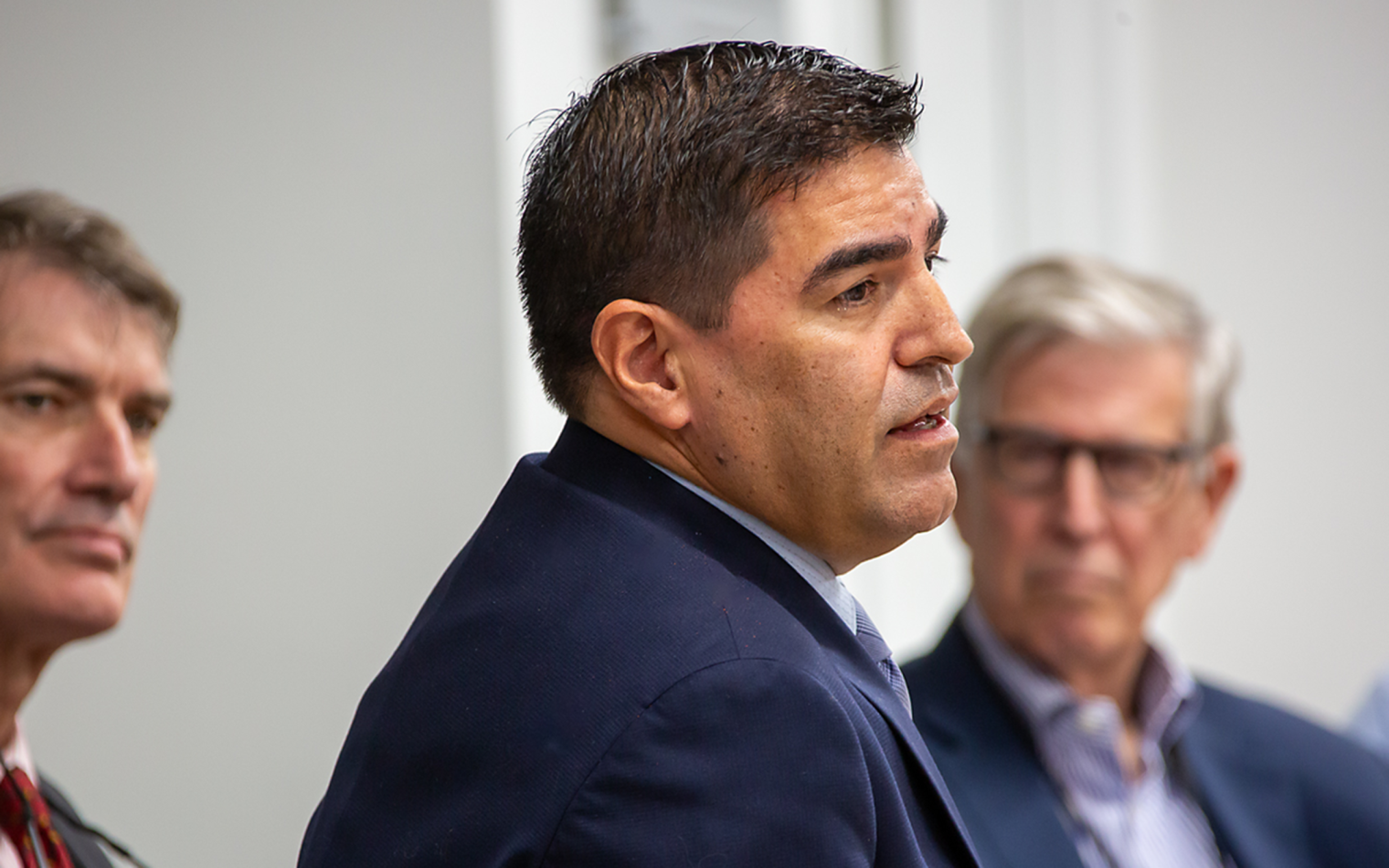 |
| DOE Fusion Energy Sciences program head Jean Paul Allain speaks at Princeton Plasma Physics Lab in October 2023. (Michael Livingston / PPPL) |
New DOE Fusion Head Sketches Out Vision
Jean Paul Allain, who took the helm of the Department of Energy’s fusion program last summer, detailed his priorities in a presentation last month to the Fusion Energy Sciences Advisory Committee. Allain said the program will push to expand collaborations between academia and industry, including through new Fusion Innovation Research Engine (FIRE) Centers focused on “use-inspired, use-defined” research that addresses key gaps in fusion materials and technology development relevant to building a pilot fusion power plant. Stressing the increasing global interest in the field, Allain estimated that China is spending roughly $1.5 billion a year on fusion energy and is taking actions along the lines of those proposed in the U.S.’ own long-range plan for fusion, which FESAC published in 2020.
Allain noted DOE has asked FESAC to report back by fall 2024 on what elements of the fusion program should be prioritized to better support both the long-range plan and the White House’s “bold decadal vision” for accelerating development of fusion power plants. Allain said he aims to restructure DOE’s fusion budget to better support the long-range plan. Among other actions, Allain said he intends to launch a New Emergent Plasma Concepts program to explore potential alternatives to the tokamak approach to fusion and to establish Plasma Frontier Research Centers focused on advancing fundamental plasma science and exploring ways to apply plasmas “in every part of life.”
Biden Approves Annual Defense Policy Update
On Dec. 22, President Joe Biden signed the National Defense Authorization Act for Fiscal Year 2024, which the Senate passed by a 87-13 vote and the House by a 310-118 vote. The law broadly updates policy for the Department of Defense and National Nuclear Security Administration, and notably it does not include various research security measures and diversity program restrictions that were in the House’s version of the legislation but not the Senate’s. It does however restrict DOD from hiring for diversity, equity, and inclusion positions until it provides Congress an assessment of such roles and it directs DOD to limit foreign research institutions the department deems a security risk from benefiting from funds DOD provides to U.S. academic institutions.
NIST Drug Research Act Also Signed into Law
On Dec. 19, President Biden signed the Testing, Rapid Analysis, and Narcotic Quality (TRANQ) Research Act, which the House and Senate passed unanimously. The act requires the National Institute of Standards and Technology to research methods of detecting novel synthetic opioids, psychoactive substances, and xylazine — a non-opioid sedative and tranquilizer that is approved only for animal use by the FDA but increasingly sold in combination with illicit drugs such as fentanyl for human use. The bill was first introduced by a bipartisan group of House Science Committee members led by Reps. Mike Collins (R-GA) and Yadira Caraveo (D-CO).
Space Diplomacy Initiatives Announced by National Space Council
Vice President Kamala Harris convened the National Space Council on Dec. 20 to highlight new space diplomacy and coordination efforts. Harris announced the U.S. intends to include an astronaut from outside the U.S. on a moon landing mission by the end of the decade through the Artemis program. She also noted the council has released a framework and draft legislation for governing commercial space activities, adding that the U.S. intends these domestic rules to “serve as a model for global action.” Among other announcements at the meeting, the State Department’s next Science Envoy will focus on space policy and the department will partner with NASA to increase the number of Embassy Science Fellows with backgrounds in space. NASA also released a report on options for building a laboratory in low-Earth orbit to replace the International Space Station after its decommissioning, currently slated for sometime after 2030, and the White House published an updated Space Weather Strategy and Action Plan, which aims to improve the resilience of U.S. infrastructure to space weather and increase the accuracy of space weather forecasts with new observatories in orbit.
Physics Societies Sign Statement on International Collaboration
Last month, a group of 16 physical science societies issued a statement of principles for international scientific collaboration. The U.S.-based signatories are AIP, the American Physical Society, and Optica, and the other signatories include national physical societies from Europe, Canada, China, Japan, India, and South Africa. The statement highlights the importance of international scientific collaboration to the progress of science and notes how scientific cooperation can also foster “mutual understanding across political and ideological divisions.” The statement also emphasizes that scientists must balance their desire for openness against national security concerns, as well as respect intellectual property agreements and local laws. The statement calls on scientists to adhere to the principles of integrity, transparency, and reciprocity in their work, and to petition their governments to enact travel and visa policies that support scientific collaboration and foster exchange opportunities for early-career scientists.
Former Science Committee Chair Eddie Bernice Johnson Dead at 89
 |
| Rep. Eddie Bernice Johnson (D-TX) at a 2011 hearing held by the House Science Committee, which she went on to chair. (Bill Ingalls / NASA) |
Former Rep. Eddie Bernice Johnson (D-TX), who chaired the House Science Committee from 2019 to 2022, died on Dec. 31 at the age of 89. Johnson began her career as a nurse before turning to Texas state politics in 1972. She was first elected to represent her Dallas-area district in 1992 and served as a member of the House Science Committee throughout her time in Congress. She rose to lead the committee’s Democratic membership in December 2010, continuing in that role until her retirement 12 years later. In that position, she worked to maintain the committee as a haven for bipartisan cooperation, including while developing many of the science provisions for the CHIPS and Science Act of 2022, the committee’s signature achievement during her time as chair. These provisions incorporated measures encouraging diversity in the STEM workforce, a cause for which she was a key champion. As recognition for that advocacy, she became the namesake for the National Science Foundation’s Eddie Bernice Johnson INCLUDES Initiative in 2023. Johnson was herself the first woman and first African American to chair the Science Committee since its establishment in 1958.
(Correction: An earlier version of this piece provided an incorrect number for Johnson’s age. She died at 89, not 88.)
|